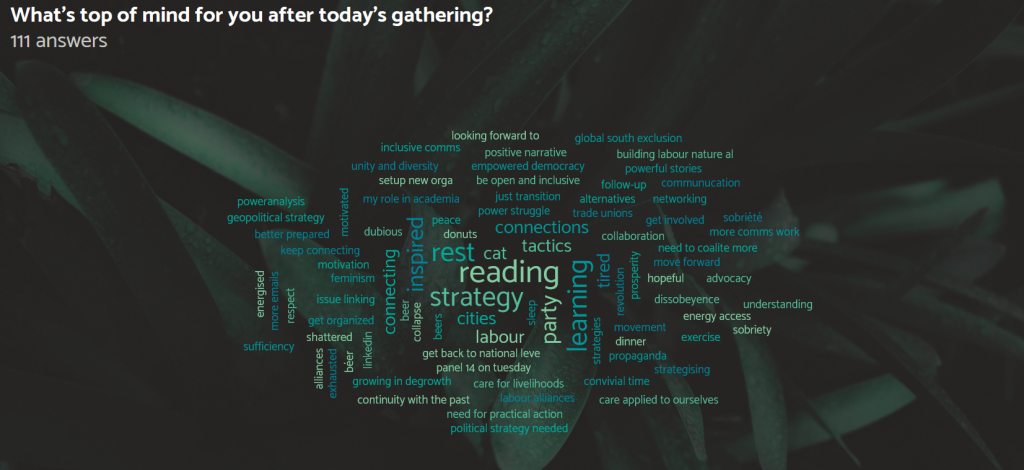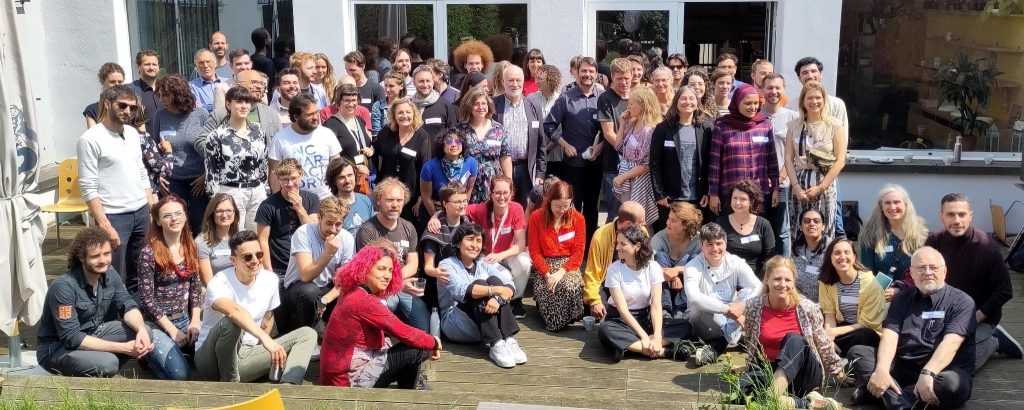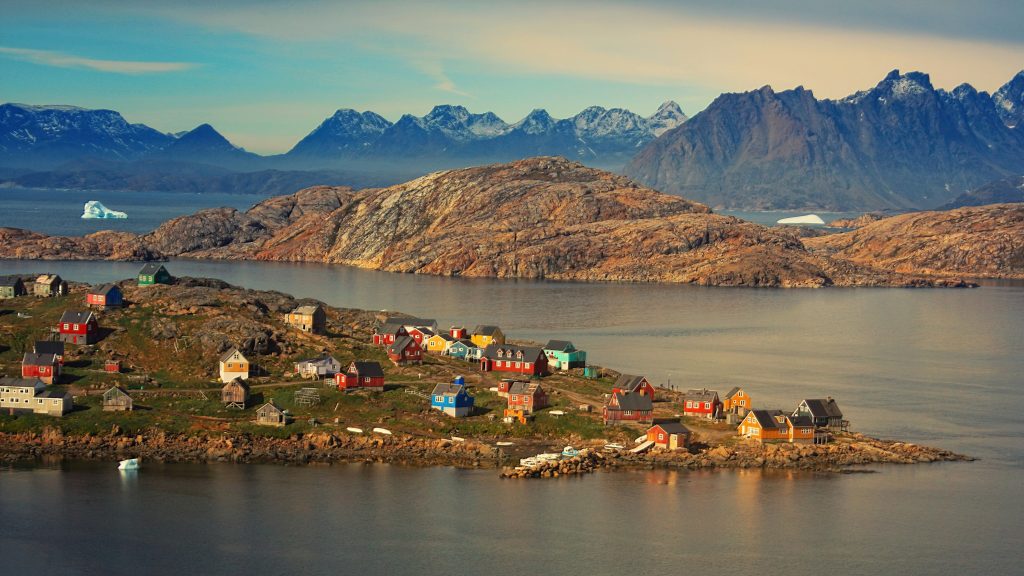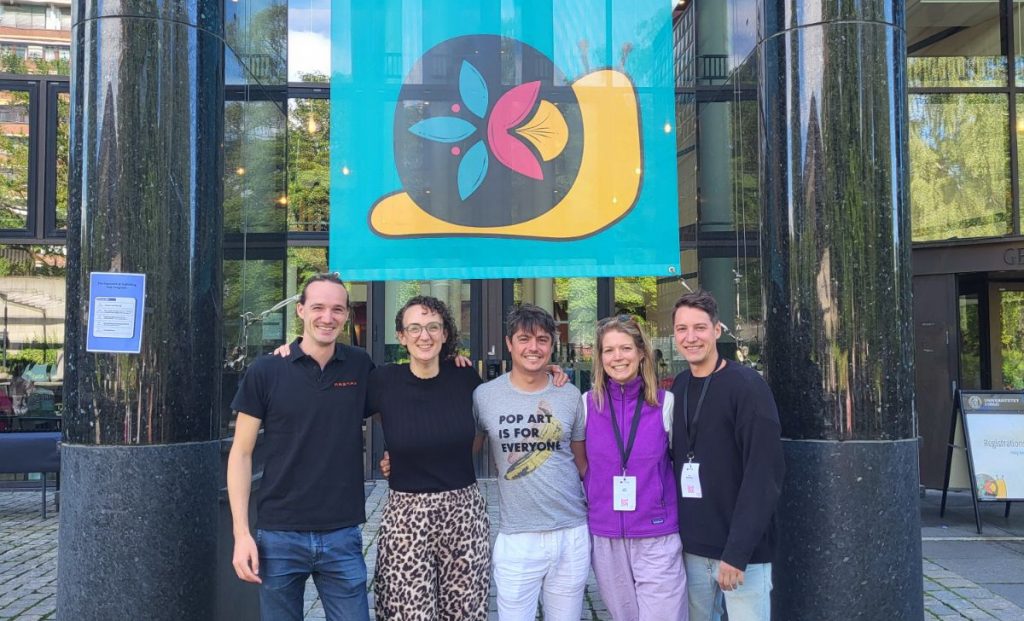The Beyond Growth civil society gathering, organised by Friends of the Earth Europe, European Environmental Bureau (EEB), European Youth Forum and Wellbeing Economy Alliance (WEAll) members took place on 14 May in Brussels. Not coincidentally this was right before the 3-day Beyond Growth Conference at the European Parliament which, with over 7000 participants, made the hemicycle burst with energy like probably never before. – Blog by Boon Breyne, resource justice intern
Early on a Sunday morning, just before the start of our event I was looking at an attendance sheet completely full with signatures. 82 passionate people from NGOs, trade unions, academia, activism and more had come together to connect, share knowledge, and unify their visions for a post-growth Europe. My colleagues set the intentions for a caring, courageous, and creative space, and we started the day with some stretching and grounding. With a satisfying breathing exercise, we connected back with ourselves and each other. Sunday morning vibes made sure no one had to run away for meetings or calls!
François Schneider, Vincent Liegey and Halliki Kreinin’s introduction to degrowth as a movement immediately set a common ground and boosted our motivation to contribute. The three emphasised two paramount elements that were part of the movement’s birth some 20 year ago in France. Firstly, degrowth evolved out of a Global South perspective towards the Global North, which consumes more than its fair share of materials and energy. And secondly, the movement’s founders consciously chose a word that aims to prevent co-optation, a form of greenwashing that waters down the original intended meaning of a term, as happened with the word “sustainable.” So far, degrowth as a term is holding strong and it went from a provocative slogan to a political movement using knowledge, civil disobedience, and political advocacy to decolonise the dominant concept of economy and re-invent democracy. One participant made a warm plea to play metaphorical ping pong with the European Environmental Agency and IPBES, institutions that are already producing strong degrowth and post-growth reports, which civil society should use and engage more with.
The remainder of the day brought us three blocks of parallel breakout sessions. In the morning, the topics were as diverse as: cross-generational exchange, racial inequalities, post-rentier economy, feminist economies, and the session I attended: human nature.
In his session on human nature, Tadeáš Ž?árský opened the economic growth debate towards the level of values and cultures. The homo economicus was torn down and everyone agreed we humans are social beings. So, are we rather more collaborative or competitive by nature? Tadeáš explained how the current domination culture assumes growth to be natural, desirable, inevitable, and infinite. Instead, he envisions a world that thrives in a partnership model. But how do institutions engrain a certain ideology into our thinking? Does the incumbent school system assume we are lazy because we need the motivation of good grades to learn anything at all? Before we know it, our minds are opened to envisioning a thorough and holistic system change.
The second block of sessions connected post-growth respectively with cities, with food sovereignty, with businesses, with circularity and finally with the financial system.
The financial system is for many the core of the matter when it comes to shaping an ecologically and socially just new economy. And indeed, the WEAll presenters explained that the European Union’s fiscal governance gives strict guidelines to enshrine constant economic growth, propped up by its preventive and corrective arms. The group of attendees together exposed a wide spectrum in this topic between just reviewing fiscal rules and the complete overhaul of how we look at money, which remains a social construct after all. The major challenges that surfaced all too often is how deeply unequal the global financial system is created and maintained, and secondly, how mobilising people around changing the fiscal system remains so difficult.
The third and final breakout sessions attempted to channel this knowledge into what seems to be the elephant in the room (or the friendly black cat in the room?): a strategy on how to move forward. Different approaches were cooperation with trade unions, the Global South, talking political strategy and finally: communication.
Because of my personal activism background, I had been impatient to attend the communication session to discuss how we could translate many overwhelming academic studies to a language that speaks to a wider audience. In the workshop organised by Chloé Mikolajczak and Séba Hendrickx, many concerns around this topic were grouped in a SWOT-analysis. What are the strengths, weaknesses, opportunities, and threats of the message we want to bring? The opportunity that broad coalitions could be built around a new economy inspired many, but on the flipside, we know we are up against strong myths. While trying to answering these questions, it was inspiring to see how bringing together different perspectives really paid off. Therefore, one of my main take-aways from the gathering is acknowledging the power of collective intelligence in an open-minded and respectful environment.
A poll we set up at the start and end of the day confirmed the huge success of our gathering. Firstly, we felt a lot more connected! Having time to share stories and wisdom resulted in a bonding that energises us and helps tremendously to push a movement forward (…though it cannot be measured by GDP!) Secondly, people felt better prepared for the Beyond Growth Conference that was looming next door. We enjoyed each other’s expertise and unique perspectives on the world driven by our proper experiences. Lastly, our deep and strategic discussions steeled us to fight for a new economy beyond growth, for a different and better world.








